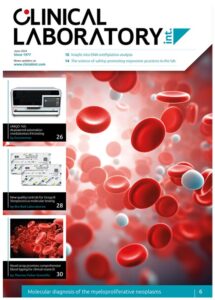Evonetix demonstrates novel enzymatic DNA synthesis method
Evonetix, the synthetic biology company bringing semiconductor technology to DNA synthesis, has achieved enzymatic DNA synthesis capability with its proprietary, thermally controlled synthesis chemistry. The culmination of a three-year development programme, supported by Innovate UK and in collaboration with Durham University, the results demonstrate that Evonetix’s unique, semi- conductor array-based platform is compatible with both chemical and enzymatic DNA synthesis, enabling the production of scarless DNA sequences that are directly compatible with down-stream processing.
Synthetic biology is expected to impact many industries, but the production of high-fidelity DNA at scale, without the need for post-synthesis error correction, has remained a challenge. Evonetix‘s unique approach re-engineers traditional phosphoramidite synthesis chemistry to use thermal, rather than acidic, control of deprotection reactions. This approach enables parallel synthesis of thousands of sequences on a single chip.
The research was directed by Dr Raquel Sanches-Kuiper, VP of Technology at Evonetix, whose enzyme engineering team has focussed on the development of enzymes that can incorporate Evonetix modified nucleotides efficiently. The programme was completed in collaboration with Dr David Hodgson, Associate Professor of Chemistry at Durham University, whose group was involved in developing the modified nucleotides for enzymatic synthesis in Evonetix silicon arrays.
Dr Raquel Sanches-Kuiper, VP of Technology at Evonetix, said: “We have, for the first time, demonstrated thermally controlled enzymatic DNA synthesis. Our approach brings together thermally controlled synthesis and error detection, allowing for high-throughput assembly of high-fidelity gene-length DNA at scale. Our synthesis platform can now be used with both enzymatic and chemical synthesis, allowing us to smoothly integrate our enzymatic approach as this technology develops. Our unique, on-chip, synthesis and error correction platform will overcome many of the existing challenges in current approaches to de novo gene synthesis.”
Dr David Hodgson, Associate Professor of Chemistry at Durham University, added: “We have been able to combine our world leading expertise in nucleotide chemistry with the novel Evonetix approach for enzymatic DNA synthesis, enabling cleaner, simpler synthesis reactions that will ultimately allow for scaled production of high-quality synthetic DNA with revolutionary applications across industry and research.”
Simon Rowland, Innovate UK, commented: “Engineering Biology was identified in the 2021 UK Innovation Strategy as one of the key technologies that will deliver future economic success in the UK. The rapidly growing synthetic biology market is estimated to reach $40 billion by the mid-2020s. Innovate UK is proud to have supported Evonetix and the development of this game changing innovation in DNA synthesis.”




